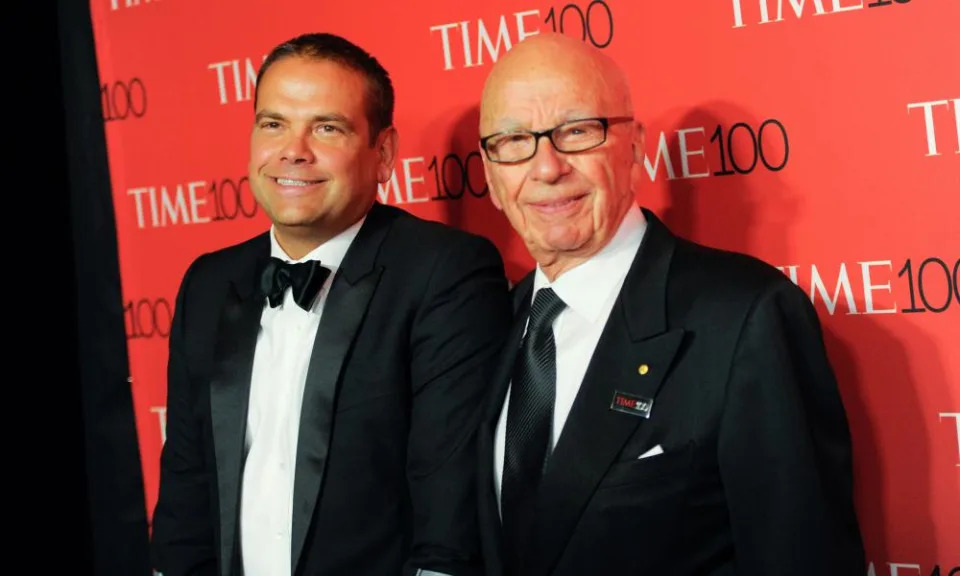Rupert Murdoch may be vacating the chair but his influence over his media empire remains
RIGHTWING TRICONTINETAL
Sun, 24 September 2023

Photograph: Evan Agostini/Invision/AP
On 9 September 1953, a small page-two item in the Adelaide News announced: “Mr Rupert Murdoch, son of the late Sir Keith Murdoch, is to join the staff of News Ltd.” Seventy years later almost to the day, the news of his resignation as chairman of the global media empire that company became arrived to noticeably more fanfare.
When I started writing about the 92-year-old’s early years, the inevitability of his exit presented a poignant vantage point to take stock of how the Murdoch model came to be, when the endpoint — and the damage — is clear.
Like News Corporation’s new chair, Lachlan Murdoch, Rupert was groomed for success by his father, Sir Keith. One of Australia’s most prominent and controversial newspapermen, Murdoch Sr had spent his final years acquiring companies such as News Ltd as part of a small family chain for his occasionally wayward son to inherit — a son he regarded as a “zealous Laborite” with “alarming left-wing views”, but hoped might lead a “useful altruistic and full life” in the media.
In 1953, South Australia had been run by a gerrymandered conservative government for decades, and Murdoch’s The News actively catered to the disenfranchised, Labor-voting readership that its rival, The Advertiser, wasn’t speaking to. Rupert’s personal politics at the time happened to align with those readers, but speaking directly to an untapped audience’s grievances while shaking up a complacent establishment would become the Murdoch playbook, from The Sun to Fox News.
These stories go some way to explaining the foundational contradictions evident in Rupert’s folksy parting dig this month at “elites” in “cahoots” with the non-Murdoch media. How he could fashion himself an outsider, sticking it to “elite” establishments all around the world, even as an Oxford-educated heir to a lineage of populist press barons from his father, Sir Keith, to Keith’s mentor Lord Northcliffe, to the American “yellow press” moguls Northcliffe emulated.
They show how Rupert has relished challenging systems and smashing norms for short-term profit and muscling his way into a market, with truth and consistency becoming secondary to landing a deal or winning a fight. Which is one thing when running an afternoon paper in 1950s Adelaide or 1960s Sydney, but which has an undeniably corrosive effect when rolled out on an industrial scale across the English-speaking world.
Related: Rupert Murdoch walks off a diminished figure and the media world he ruled is also ebbing away | Margaret Simons
Rupert’s 70 years in the business have been marked by technological disruption and globalisation. The young man who made an awkward, fumbled bid to secure some of Australia’s first commercial television licences in 1958, became the great union-smasher of Wapping in the 1980s, backed by Margaret Thatcher and labour-saving, job-slashing computer technology. He seized these changes to achieve a scale and influence surpassing all his predecessors, to become the last newspaper tycoon.
The media world Rupert leaves behind is almost unrecognisable from the one he inherited. His resignation letter thanked the truck drivers, cleaners, assistants, and camera operators of his modern enterprise, but not the legion of workers once required to report and make the news with hot metal and ink, clattering typewriters, and rumbling presses — now ancient history.
The landscape has changed, but so many of the questions playing out at the start of the Rupert era are still being asked today. Questions about monopoly and polarisation, about how our media and politics are being captured by capital and vested interests. About public discourse being recklessly riled up for profit by outlets that are structurally geared towards sensationalism and conflict. Rupert’s son Lachlan might now have the chair, but there are plenty of disruptor-reactionary capitalists vying to be his father’s spiritual successor.
Related: Former Australian PM Malcolm Turnbull says Rupert Murdoch’s ‘anger-tainment’ damaged the democratic world
As for Rupert, his resignation note suggests he might never really leave, promising to remain involved “every day” with “thoughts, ideas, and advice” and even threatening to haunt the office on Friday afternoons. Lachlan is now closer in age to Sir Keith when he died than Rupert when he took over. The son will never enjoy the mix of privilege, freedom, and youthful iconoclasm his father enjoyed as a 22-year-old in the hot seat.
I was reminded of a similar farewell note written in December 1949, when Sir Keith Murdoch announced his resignation as the Herald and Weekly Times’ managing director after a health scare. It was thought to be the beginning of his retirement, but he too stuck around, and as chairman spent the remaining three years white-anting his successor, John Williams, while quietly building up a rival chain for Rupert to inherit. Sir Keith’s final act was to lead a boardroom coup against Williams, defiantly reasserting his control over the company.
For the past century, the story of the Murdochs in the media has been about that endless pursuit of control and power. Even as a self-titled Chairman Emeritus — whatever that means — Rupert’s old habits may yet die hard.
• Walter Marsh is a journalist and the author of Young Rupert: the making of the Murdoch empire (Scribe Publications)
Murdoch brainwashed Britain. That’s the comforting tale the left tells itself. But is it true?
Gaby Hinsliff
Sun, 24 September 2023

‘What are you going to do about the Sun?” It was the first question Neil Kinnock asked, when a bunch of eager young political advisers setting up a now long-forgotten campaign for Britain to join the single currency begged his advice. By then an EU commissioner, Kinnock had never forgotten the paper’s devastating 1992 front page asking the last person left in Britain to turn out the lights if Labour won. But for decades now, his question has haunted the liberal left.
The Murdoch press has earned a fearsome reputation among progressives as a kind of giant toad squatting in the road, blocking the way to everything from higher taxes to gay rights and, above all, closer relations with Europe. Few did more to pave the way for Brexit than the immigrant-bashing, Brussels-baiting Sun, whose once cheeky Euroscepticism had descended by 2015 to the nadir of a Katie Hopkins column describing migrants drowning at sea as cockroaches. “Show me pictures of coffins, show me bodies floating in the water … I still don’t care,” she wrote. Across the Atlantic, Rupert Murdoch’s Fox News channel offered a similarly shrill platform for the angry, increasingly paranoid voices who would propel Donald Trump to power. Though he eventually came to regret enabling Trump, when the 92-year-old Murdoch finally relinquished the reins of his empire to his son Lachlan last week, it was with one last defiant populist attack on the “elites” supposedly setting the political narrative.
The comforting story the left tells itself after every lost election is that without Murdoch or the Mail it could have won
There’s not enough salt in the world to take with that sentence, coming from a billionaire treated by world leaders like an angry god to be appeased. Murdoch told the Leveson inquiry into press misconduct that he’d “never asked a prime minister for anything”, but if so that was perhaps because so many prime ministers scrambled to find out what he wanted without him having to ask. (Fear of Murdoch helped persuade Tony Blair not to call that promised referendum on joining the euro, one of his former spin doctors told me; the Sun’s then political editor, Trevor Kavanagh, was known, only half-jokingly, in Whitehall as “the real Europe minister”.)
But if the right is too easily sold on silly populist conspiracy theories about a woke liberal elite controlling everything, the left has its own version. The comforting story it tells itself after every lost election is that without Murdoch or the Mail it could have won, as if Britain would be a liberal utopia if only the tabloids hadn’t somehow brainwashed everyone. To see Murdoch as a wizard of such supernatural gifts is to misunderstand the origins of his power: put simply, people.
Wondering what would happen in British politics if Murdoch’s iron grip lessened? Just look around: it’s already happened. Power has been quietly ebbing for years away from his titles, alongside the rest of the mainstream media, towards Facebook and X (formerly Twitter) and YouTube, platforms founded primarily by liberal tech bros and now swamped by white supremacists, Russian propogandists, haters and cranks. It’s new, not old, media increasingly driving the political volatility that has so destabilised western democracies, by taking what Murdoch did – giving the punters what they seem to want – to new extremes. His genius lay in a gut feeling for what angered or moved or titillated millions, long before algorithms made that easy to work out. He grasped the desire to be entertained, and to feel as if you mattered. (Both the serious investigations into matters of high public importance that his Sunday Times pursued and the tub-thumping at the Sun made their respective readers, in different ways, feel powerful and influential by association.) He confirmed his audience’s prejudices but hardly invented them, growing stronger the more politicians avoided confronting him, and by association, them.
His Sun backed Blair over John Major in 1997 at least partly because it could see its readers had already made the leap
Ironically, one of his executives once told me, Murdoch was privately scathing about politicians who kowtowed too much to him: he admired guts and conviction. He was also a businessman first and an ideologue only second, lobbying harder on commercial issues – media regulation, or funding of his rival, the BBC – than on purely political ends, and responding surprisingly pragmatically to shifting times. His Sun backed Blair over John Major in 1997 at least partly because it could see its readers had already made the leap, so why lose face by trying and publicly failing to convince them? Better to extract whatever concessions it could from Labour, in return for Murdoch’s blessing. Keir Starmer’s invitation to the annual Murdoch summer party this year suggests a similar willingness to at least run the rule over the Labour leader, despite lingering anger over his role in News UK’s public humiliation over phone hacking. (As director of public prosecutions, Starmer brought charges that ended in the jailing of the former News of the World editor Andy Coulson, by then David Cameron’s director of communications.)
Since that scandal, Murdoch’s involvement in British public life has palpably receded. For all the talk of launching a British Fox News, here it’s GB News, owned by the hedge funder Sir Paul Marshall, that has become the shrill, shameless voice of British populism and the most pressing challenge for regulators.
That’s no excuse for complacency over the legacy of a man once described as a cancer on democracy. But it is a reminder, perhaps, of the risks of personifying evil in one man. The problem wasn’t Murdoch so much as the human instincts he tapped into, and politicians’ fear of challenging him. Whatever the next Labour leader chooses to do about the Sun, what matters is not being blinded by it.
• Gaby Hinsliff is a Guardian columnist



















